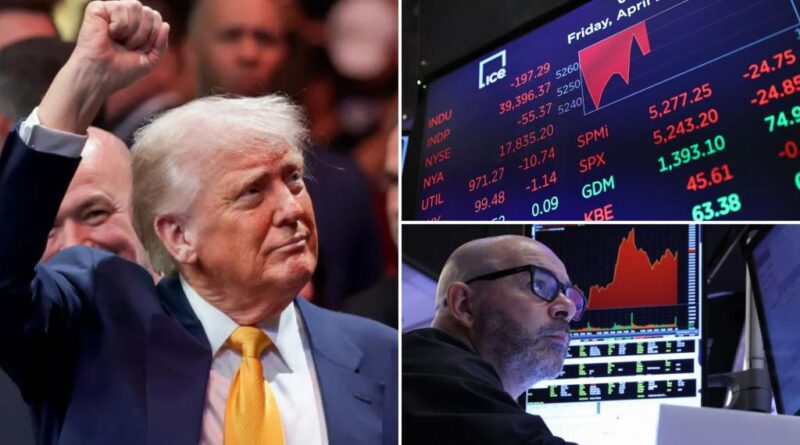Trump Raises Tough Tariff Questions That Critics Are Avoiding

There are ten important tariff questions that remain unaddressed but warrant discussion.
1) The impact of President Donald Trump’s “trade war.”
Many characterize the American pursuit of either tariff equality or a reduction in the substantial $1 trillion trade deficit—an issue persisting for 50 consecutive years—as a “trade war.”
What term would they use to describe the last fifty years of practices by Europe, Asia, China, and others to maintain uneven tariffs, various trade restrictions under the guise of health and security, and large trade surpluses?
Perhaps they would call it a trade peace? Or trade fairness?
2) Do countries genuinely prefer surpluses over deficits?
What drives most nations to favor trade surpluses and protective tariffs?
Are Europe, Asia, China, and others making misguided choices by upholding their trade surpluses and protective or asymmetrical tariffs?
Is the United States exceptionally wise for sustaining a half-century of trade deficits?
Do Americans uniquely recognize the benefits of a $1 trillion annual trade deficit alongside minimal or nonexistent tariffs?
Why do America’s trading partners not desire deficits like ours—when we ostensibly view them as beneficial or inconsequential?
3) Would other nations prefer to exchange places with the U.S.?
Would our trade partners wish to inherit America’s alleged advantages associated with a $1-trillion trade deficit?
Would the U.S. then face “misery” akin to theirs, operating under $200 billion annual surpluses?
4) What if wages increased at the same rate as the stock market?
How would the stock market react if, over the past decade, wages had risen in line with stocks, and stocks similar to wages?
5) Is Wall Street’s anxiety driven by potential future events or existing circumstances?
Is Wall Street’s turmoil stemming from fears about what might be forthcoming? Or is it a response to March’s latest jobs report, indicating 93,000 more job creations than anticipated?
Did Wall Street’s panic arise from news of declining oil prices?
Was the uproar triggered by the March inflation report revealing that the annual inflation rate had dipped to 2.6%?
6) Is the consternation linked to the Trump economic agenda?
Is Wall Street concerned that upcoming tax cuts, increased deregulation, budget reductions, and continued attempts to eliminate the budget deficit and diminish the national debt might hinder economic growth?
7) What’s the perspective of our North American neighbors?
If the U.S. were running a $63 billion-plus trade surplus with Canada, while neglecting its NATO obligation to spend 2% of GDP on defense and only investing 1.37%, would Canada be concerned?
If Mexico were experiencing a $171 billion trade deficit with the U.S., with Americans in Mexico sending over $60 billion annually back to the U.S., and if U.S. drug dealers were profiting $20 billion through the sale of fentanyl and opioids in Mexico, would Mexico remain indifferent?
8) Is the Trump agenda a detrimental economic force?
Is the current anxiety regarding tariffs amplified by Trump’s other policies?
Is the immediate drop in 10,000 illegal border crossings a cause for concern in Wall Street?
Is the media upset that the Red Sea is once again navigable, as the Houthis in Yemen reduce their assaults?
Does the outrage stem from plans for approximately $200 billion in budget cuts or proposals to eliminate $500 billion from the annual budget?
Does this confusion arise because Trump is imposing sanctions on Iran, unswervingly supporting Israel, and aiming to conclude the Ukraine War?
9) Was the Biden administration’s record more favorable?
Should Trump aim to replicate former President Joe Biden’s $7 trillion increase to the national debt?
Is he expected to revert to allowing 12 million undocumented immigrants into the United States?
Was the 2021 withdrawal from Afghanistan a model worth emulating?
Is Wall Street apprehensive that Trump might adopt Biden’s New Green Deal, his electric vehicle mandates, and additional environmental regulations?
10) What prompts the negotiations, and why at this moment?
Why are 70 countries currently looking to negotiate tariffs with the U.S., seeking to lower them to zero or match our rates?
Is this a positive development? If so, why weren’t our trade partners inclined to lower their barriers sooner?
Did they collectively and spontaneously realize they were acting unfairly and now wish to amend their ways?
What might occur next?
If nations eagerly rush to strike agreements with the United States, striving to avoid exclusion from the American market, will Wall Street respond with another frantic spasm—not to sell, but to purchase stocks at favorable prices?
Victor Davis Hanson is a distinguished fellow at the Center for American Greatness.



